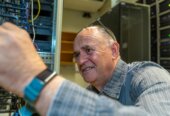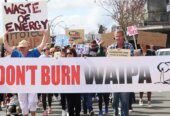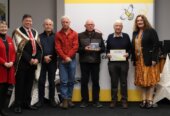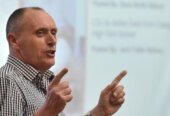I write this column each week because I believe it is our responsibility as scientists to share what we know, especially when our areas of research can deeply impact communities. Te Awamutu is my hometown full of good people who provided me with the support and encouragement as I was growing up. This is where I built a solid foundation for the very tough challenges that I would face becoming a volcanologist. I want to give back.

Janine Krippner
Knowing how the Waipā district could be impacted by eruptions, it is my hope that having more background knowledge means you are all more equipped to act if needed. At the very least, you can have a better understanding of some of our planet’s most fascinating processes and have the knowledge to call out misunderstandings in popular media (like volcanic ash vs. smoke).
One of the best parts of working to share what we know is connecting with others who are also passionate about doing more to empower our communities. Living in the United States I had a large network of friends and colleagues across volcanology, seismology, extreme weather, social sciences, emergency management, and response. Knowing how to get information to people in the right way is surprisingly complex and learning from other hazards fields is so important. Especially when one of these areas has tornado, hurricane, and winter storm seasons each year where lessons are learned from mistakes and successes alike.
Here there are opportunities to work alongside groups like Civil Defence NZ and GNS Science, who are also invested in being useful for our people.
Through the upcoming ‘A Waikato Thing’ podcast, Waikato Civil Defence has gathered experts across the country to discuss volcanoes, earthquakes, tsunami, and severe weather.
I jumped at the chance when I was asked to take part. Understanding the landscape around us and how it can impact us is an important part of progress, adapting, and prospering. Not understanding our landscape leads to undiscovered weaknesses in our communities that can have catastrophic impacts that sometimes-simple measures could have prevented.
I hope that having this conversation dedicated to how we live with our Waikato-specific natural processes, with insights from research and Mātauranga Māori, leads to discussions within our communities.
We are not powerless when it comes to living with volcanoes, tsunami, earthquakes, and severe weather. There are actions we can all take that can increase our resilience. Sometimes this is as simple as knowing to go up hill if you’re on a beach and feel a long or strong earthquake, getting out of a valley leading from a volcano if you hear, see, or feel something that might hint that a lahar is on its way, or understanding how volcanic ash can impact livestock.
If we are unfortunate enough to experience a large disaster in our lifetimes, and there is a real chance that we will, we must know what actions to take as individuals and businesses. The very nature of disasters leave our systems overwhelmed, we must understand what to do when communications go down and help cannot reach us right away. Knowledge plus action can prevent or reduce suffering and help us to bounce back faster.
Far away from the majority of the world’s populations, Aotearoa has grown to what it is by Kiwis being resourceful, for making it through tough times, and for adapting.

Janine Krippner checks her camera settings while on volcano watch. Photo: Drew Mehrtens.









